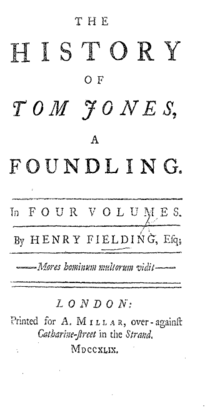
 Last week we learned everything except who killed JR and what is the Colonel’s secret blend of herbs and spices. This week we see what happens after the beans are spilled (and learn a thing or two in addition).
Last week we learned everything except who killed JR and what is the Colonel’s secret blend of herbs and spices. This week we see what happens after the beans are spilled (and learn a thing or two in addition).
Mrs. Waters has one more bit of commendation for Tom, telling Allworthy:
…it was then I accidentally met with Mr Jones, who rescued me from the hands of a villain. Indeed, he is the worthiest of men. No young gentleman of his age is, I believe, freer from vice, and few have the twentieth part of his virtues; nay, whatever vices he hath had, I am firmly persuaded he hath now taken a resolution to abandon them.
The attorney, Mr. Downey comes along at this point and Allwrothy gets him to spill the beans—why did he approach Mrs. Waters, who put him up to that, who put him up to getting the support of witnesses for the prosecution. He even gets Downey to admit that he knew Tom was Allworthy’s nephew, he’d told Blifil and had given Blifil a letter from his mother to Allworthy about it. Not surprisingly, Blifil neglected to pass along the messages. Which pretty much seals both of their fates in Allworthy’s eyes.
Western pops in, beside himself about this letter he’s found from Tom to Sophia—the most recent one. He wants these shenanigans finished and has locked her up again. Allworthy talks him down from that, promising to go talk to Sophia that day.
Mrs. Miller’s worried about what horrible things Mrs. Waters told Allworthy, and tries to defend Tom. Instead, Allworthy tells her what he’s been learning, closing with
O! Mrs Miller, you have a thousand times heard me call the young man to whom you are so faithful a friend, my son. Little did I then think he was indeed related to me at all.—Your friend, madam, is my nephew; he is the brother of that wicked viper which I have so long nourished in my bosom….Indeed, Mrs Miller, I am convinced that he hath been wronged, and that I have been abused; abused by one whom you too justly suspected of being a villain. He is, in truth, the worst of villains.
As he leaves to go talk to Sophia, Allworthy says something to his younger nephew about the letter from his mother, leaving “Blifil in a situation to be envied only by a man who is just going to be hanged.” While on the road, Allworthy reads the letter from Jones to Sophia, starts to understand what Tom feels about her, and gets choked up by some of what he reads about himself from Tom’s hand.
When he talks to Sophia, he spends a lot of time showing her that he’s on her side when it comes to Blifil.
I heartily congratulate you on your prudent foresight, since by so justifiable a resistance you have avoided misery indeed!
The scales are truly fallen from his eyes.
If I had married Mr Blifil—” “Pardon my interrupting you, madam,” answered Allworthy, “but I cannot bear the supposition.—Believe me, Miss Western, I rejoice from my heart, I rejoice in your escape.—I have discovered the wretch for whom you have suffered all this cruel violence from your father to be a villain.” “How, sir!” cries Sophia—“you must believe this surprizes me.”—“It hath surprized me, madam,” answered Allworthy, “and so it will the world.
This is so fun to watch Allwrothy catch up with the reader and narrator on this front.
Allworthy then goes on to try to convince Sophia to give Tom another chance—and tells her everything he learned about him that day. Sophia remains unmoved, however. I mean really unmoved.
At present there is not a man upon earth whom I would more resolutely reject than Mr Jones; nor would the addresses of Mr Blifil himself be less agreeable to me.
Things look dire for the two of them.
Squire Western, on the other hand, has a complete change of heart regarding Tom. He’s 100% Team Tom now.
After Allworthy gets back to Mrs. Miller’s, he sees that Tom is, too, and they meet again.
It is impossible to conceive a more tender or moving scene than the meeting between the uncle and nephew (for Mrs Waters, as the reader may well suppose, had at her last visit discovered to him the secret of his birth). The first agonies of joy which were felt on both sides are indeed beyond my power to describe: I shall not therefore attempt it.
A lot of flowery language flows between the two as they apologize to each other and take all the responsibility and blame for their recent problems on themselves.
Mrs. Miller tells Tom how she tried to explain things to Sophia who would not listen. Western comes in, assures Tom he’s very supportive of him now, all is good between the two of them.
The conversation which now ensued was pleasant enough; and with which, had it happened earlier in our history, we would have entertained our reader; but as we have now leisure only to attend to what is very material, it shall suffice to say that matters being entirely adjusted as to the afternoon visit Mr Western again returned home.
If that’s not enough, we get to learn the details of Tom’s release. Fitzgerald realizes that he was completely in the wrong about Tom and seeks to make amends, and gets Lord Fellamar on board, he wants to make things up to Tom, too!
Things continue to not go well for Tom’s younger brother:
…a message was brought from Mr Blifil, desiring to know if his uncle was at leisure that he might wait upon him. Allworthy started and turned pale, and then in a more passionate tone than I believe he had ever used before, bid the servant tell Blifil he knew him not. “Consider, dear sir,” cries Jones, in a trembling voice. “I have considered,” answered Allworthy, “and you yourself shall carry my message to the villain. No one can carry him the sentence of his own ruin so properly as the man whose ruin he hath so villanously contrived.” “Pardon me, dear sir,” said Jones; “a moment’s reflection will, I am sure, convince you of the contrary. What might perhaps be but justice from another tongue, would from mine be insult; and to whom?—my own brother and your nephew. Nor did he use me so barbarously—indeed, that would have been more inexcusable than anything he hath done.
Tom not only melts his Uncle’s heart with these words but lives up to them.
He goes to see his brother who is despondent—not that he’s treated Allworthy and Tom so poorly, but that it’s all falling apart. Tom encourages him that he’ll try to work things out with Allworthy, but in the meantime, Blifil needs to get his act together and take this like a man. Tom promises to treat him as a brother and to try to let bygones be bygones.
That’s a lot of stuff for four chapters of this book—and I didn’t get as detailed as I was tempted to. It doesn’t have the style (outside of a sentence or two scattered throughout) as the rest of the novel, but man, it’s fun to read now that everything is coming to light.
Next week, we finish the novel. I’m not sure how I’m going to be able to wrap things up, but I have a pretty good idea how Fielding will. Guess we’ll see.




![]()


